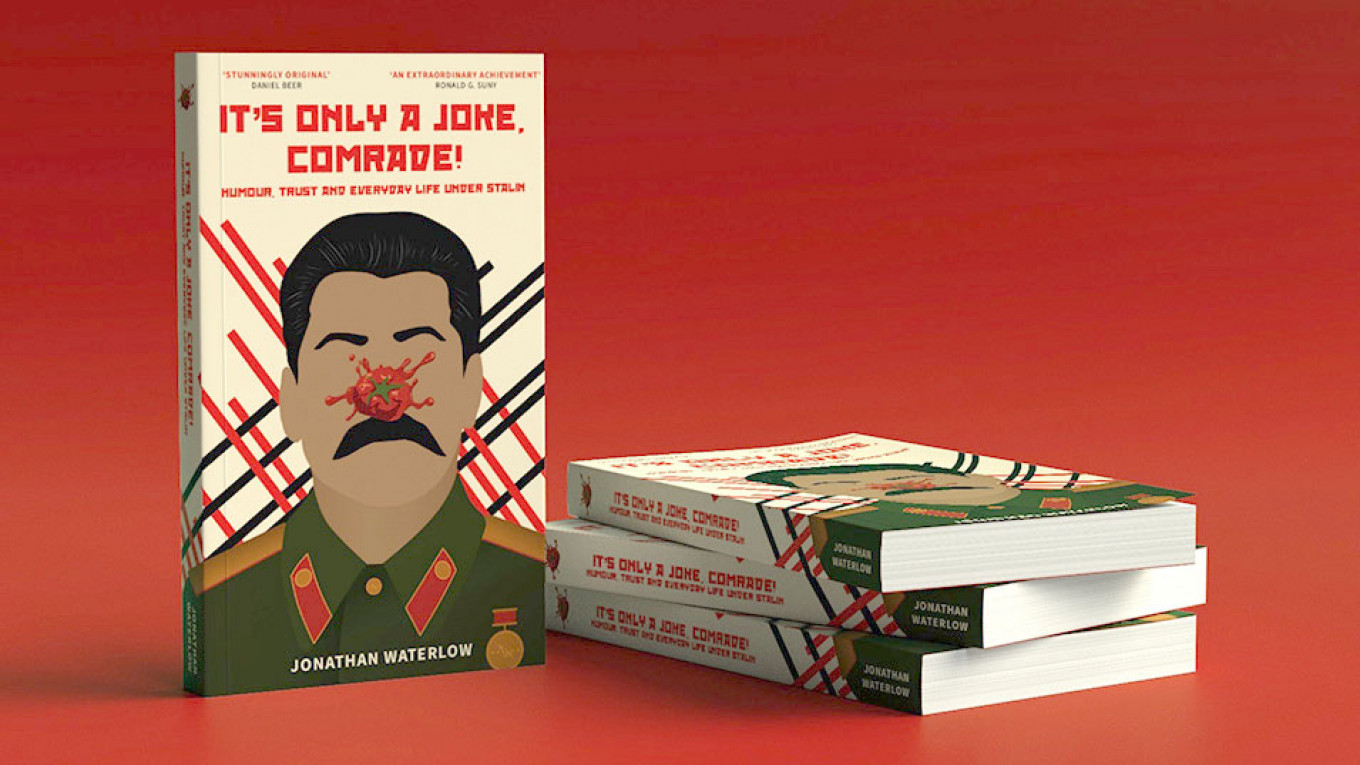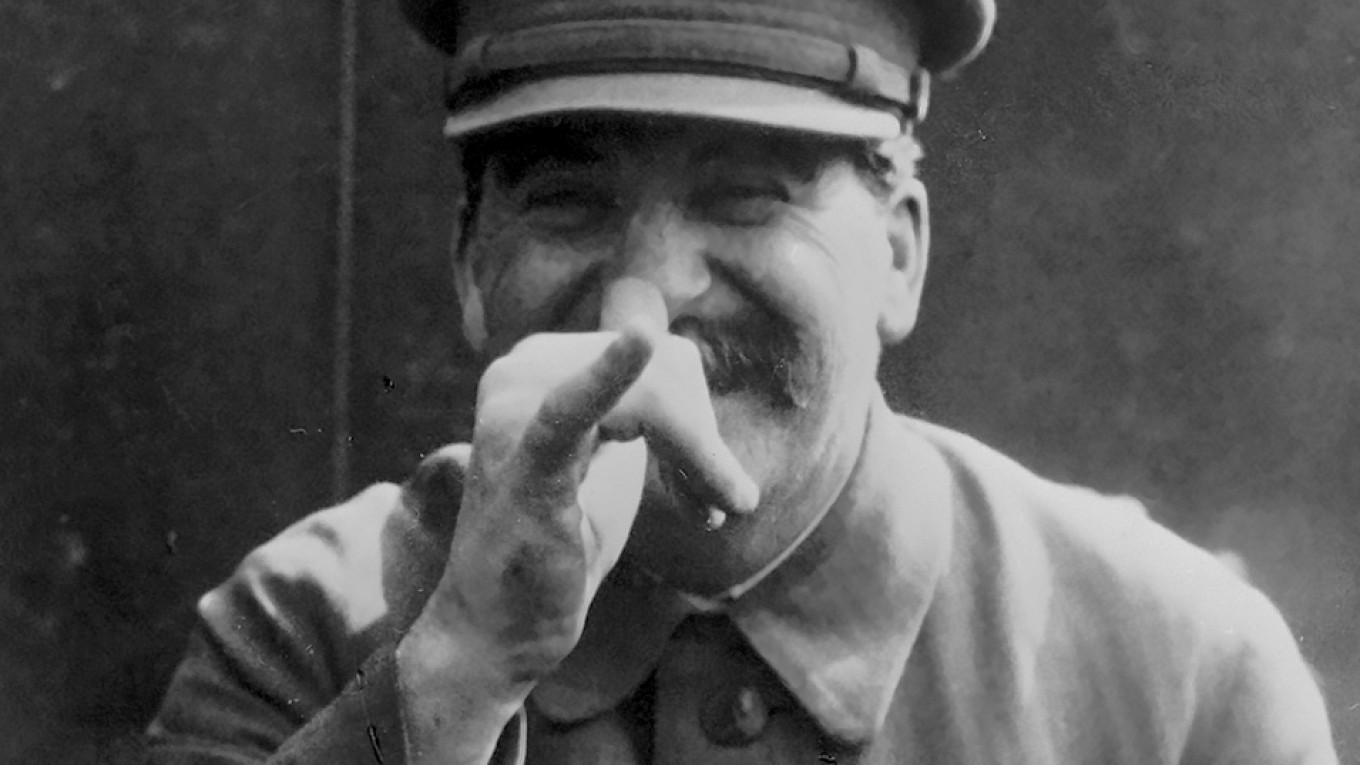An exploration of political jokes told under Stalin, “It’s Only a Joke, Comrade!” by Jonathan Waterlow, is possibly the funniest book to grow out of a doctoral project. Although it includes plenty of Soviet jokes and anekdoty (funny stories), “It’s not a joke book!” Waterlow insists. Instead, the book analyzes jokes in their historical context to consider accounts of public opinion under Stalin. Drawing on 273 criminal cases of Soviet joke tellers, Waterlow introduces the concept of “crosshatching” to show that political jokes were less a form of resistance than a way of sharing hardship, cultivating trust, and ultimately acquiescing to life under the regime.
The Moscow Times’ Anna Kasradze spoke with Jonathan over Skype about his book.
Q: How did you become interested in researching Soviet jokes of the Stalin era?
A: Since high school, I’ve been fascinated by Soviet history of the 1930s, but a lot of the historiography didn’t make sense to me. There were still scholars saying that people must either have lived in perpetual fear and trauma or been completely brainwashed to buy into the system. Nowhere in the world is a population 100% for or against its government.
History books treated jokes as creative seasoning before returning to mass arrests and brainwashing. I wanted to use jokes to understand how people tried to make sense of their lives. Most books on popular opinion of that period reflect the support/resistance split, but jokes are much more ambiguous. People are wrestling with complexities: “This is something unchangeable, but I’m finding a way to cope and deal with it.” That doesn’t make you an absolute rebel or someone who hated the regime. It helps you cope and move forward. You’re able to hold conflicting ideas in your mind. Jokes are a more fun, more interesting way to get into that, and they hadn’t been examined for what they were worth. I think Wittgenstein said you could write a whole philosophy of the human condition using only jokes.
Q: Where do you see this support/resistance binary today?
A: In the popular consciousness, there’s just an image of the gulag and repression and suffering. The Orwellian-Solzhenitsyn view dominates. There’s not much sense that people lived rich lives—that also had a lot of pain and trauma—and found meaning. Jokes are an important way to find meaning when you don’t control your circumstances. They help you feel that you have critical ability and can weave together a world that makes sense to you. In scholarship, the resistance trope hangs in the background as an implicit assumption, like the Stalin cult I mention in the book.
It doesn't undermine the seriousness and suffering of the purges to explore the other experiences people had at the same time. People still went on summer walks in Gorky Park or had drinks and shot the breeze with friends while mass arrests were happening. It's not just more realistic, it's also more respectful to understand the richness of their lives.
Q: Do you still find the jokes funny?
A: I do, but the problem is that jokes are super contextual. Lacking context, the regime saw jokes as attacks instead of a way of letting off steam or sharing hardship. Often in talks about the book, I find myself saying, “Here are ten things you need to know before this is funny.”
Q: Did jokes reduce pressure on the regime to make incremental changes that materially improved people’s lives?
A: I think you’re right from an outside analytical point of view, but the regime saw jokes exclusively as anger and resistance. We often think of jokes as a way to stand up against a dictator, but really sharing them helps us go to work the next day and get on with life. A lot of people have emotional connections to anekdoty as resistance culture (maybe their families were involved), and they don’t want to hear that jokes helped people to cope. I understand and respect that. People at the time could often feel like jokes said “No, I don’t stand for this,” but the things that we do and say can feel like something but have a different result. I don’t think there are any regimes that collapsed because people told jokes. Too often in history it’s the people not telling jokes who jump on the barricades.
Q: What most surprised you during your research?
A: Finding these sources was surprising, because I was assured I was going to fail. Another surprise was that the regime itself changed its view of humor over time. First, they considered it a dubious leftover of the pre-revolutionary past that needed to be corrected, but from 1935 they thought of it as a contagious mind virus and began censoring jokes even in the courtroom and court records. That’s a whole new level of paranoia, which really doesn’t imply a great deal of trust in their own ideology or their own people. Another surprising thing was that most people who were telling jokes thought they were the exception, that other people weren’t telling jokes in their close circles of friends.
Q: What do we not know about jokes under Stalin?
A: We don’t know who the denouncers were, although it would potentially disclose fascinating stories about the personal circumstances behind denunciation. The criminal records don’t make it clear who triggered the investigation or what sort of prior bad blood existed between these people. There’s also so much we don’t know about individual people’s stories: what joke-tellers were doing when things began to fall apart and how they got in trouble.
Q: What are some of your favorite jokes?
A: I enjoy the really simple ones where people take party slogans and say “Thank you, Comrade Stalin!” or “Life has become more joyous!” when they get bad news. That just feels so real and so human to me.
Q: What is the big take-away you hope readers get from the book?
A: The book is an invitation not to treat people in the past so differently than we treat ourselves. People come to complex and contradictory explanations of their lives as we do. Jokes help us find a way to acquiescence that feels better than anger or despair, but they don’t make us rebels.
Q: What are you working on now?
A: I have a podcast called Voices in the Dark where we explore the human condition ('learning how to human' as we put it). I also have my own website, and I'm more than happy to be in touch with readers who have questions or things they'd like to share about jokes, Stalinism, etc.

From Chapter 1: Kirov's Carnival, Stalin's Cult
Saturation
There is no doubt that many Soviet citizens venerated Stalin, but in political humour we can hear many others sharing critical opinions about him and his Cult on a day-to-day basis that rapidly presents us with a very different, more complex image. Let’s consider two anekdoty which turned up numerous times in the archival sources:
Stalin summoned a number of economists and told them he wanted to hold a feast for all the people, a feast so great they would revel (пировать) for weeks. He asked the economists how much this would cost, but no one could say. Then one spoke up and said it could be done very cheaply: ‘Buy a single bullet and shoot yourself – then everyone will celebrate’.
Stalin was out swimming, but he began to drown. A kolkhoznik who was passing by jumped in and saved him. Stalin started to ask the kolkhoznik what he would like as a reward when the latter realised who he had saved. ‘Nothing!’ he said, ‘Just please don’t tell anyone I saved you’.
In each anekdot, the underlying assumption is that the population at large hates Stalin and would prefer him dead. There’s a sense here that Stalin is the principal cause of people’s suffering; as another anekdot had it, rather elliptically, ‘In our country we have such an artist that when he performs, the whole nation weeps’. More directly, a Harvard Project respondent recalled a simple pun, altering Stalin’s propagated role as Leader and Teacher (vozhd’ i uchitel’) to Leader and Torturer (vozhd’ i muchitel’). If Stalin was ultimately to blame for their hardships, then citizens could readily imagine that his death would improve their lives.
As this implies, far from being a taboo subject for mockery, or deemed to sit benignly above politics, Stalin was considered and treated in humour as Public Enemy Number One: he was the default object of popular sarcasm, mockery and criticism, and was targeted more often than any other leading figure. As a later Romanian joke described their own dictator’s, Ceauşescu’s, cult, ‘In laughter as in life, he is at the center’.
In fact, the very saturation of the Stalin Cult became a subject of mockery in its own right. A letter sent to Andrei Zhdanov (Kirov’s successor as Leningrad Party boss) makes this point in subtly absurdist fashion, detailing in a long list the ubiquity of Stalin’s name by the later 1930s:
Dear comrade Zhdanov!
Do you not think that comrade Stalin’s name has begun to be very much abused? For example:
Stalin’s people’s commissar
Stalin’s falcon
Stalin’s pupil
Stalin’s canal
Stalin’s route
Stalin’s pole [sic]
Stalin’s harvest
Stalin’s stint
Stalin’s five-year plan
Stalin’s construction
Stalin’s block of communists and non-party members
Stalin’s Komsomol (it’s already being called this)
I could give a hundred other examples, even of little meaning. Everything is Stalin, Stalin, Stalin.
Although this author went on to encode his message as constructive advice to the leadership, actually warning them of the risk of absurdity such a prevalence of Stalin’s name engendered, many others seized on this absurdity directly. For example, a lawyer recalled that, in his workplace in Odesa, on the sign for the toilets someone appended the words ‘named after Stalin’ (туалет им. Сталина). Less overtly, some Komsomol members in Bashkirskaia oblast’ amused themselves by renaming their canteen’s dull cabbage broth ‘Stalin soup’ – an appellation that could sit quite happily alongside the others on the list sent to Zhdanov.
This vein of sarcasm as a response to the overbearing nature of the Cult is neatly summed up in an anekdot which recounts how, for an anniversary celebration of Tchaikovsky’s work, there was ‘a two-hour speech about Comrade Stalin and nothing said at all about Tchaikovsky’. A similar joke described how the centenary of Pushkin’s death (1837) would be marked with the erection of a statue which, via several planning revisions, becomes a colossal statue of Stalin holding a small volume of Pushkin’s poetry.
More significantly, rather than just mocking the Cult’s excesses, by inverting the practice of associating Stalin with every element of life or official policy, he could easily be blamed for everything. When the abolition of student grants was announced in October 1940, M.V. Pen’kov blamed Stalin directly, yelling a parody of an official slogan back at the radio announcement in a room of his contemporaries: ‘Thank you, Comrade Stalin, for [this] happy life!’ Similarly, in Saratov, an unnamed girl was sentenced to five years for being late to work, to which she responded with withering sarcasm, ‘Thank you, Comrade Stalin, for a happy childhood’, mocking another famous slogan. And, in mid-1940 when the working day was increased from seven to eight hours, Lashina, an accountant in the Northwest shipping fleet, ranted angrily to her colleagues, concluding, in tones of withering scorn, ‘Thank you, Comrade Stalin, for stretching out your hand to us, although we have already stretched out our legs,’ melding a propagandistic image of Stalin the paternal teacher with a colloquialism meaning ‘to kick the bucket’. She was not the only one to respond this way: V.A. Marandzheev, the chief of staff at a musical instrument factory, interjected during a radio broadcast of a lullaby praising Stalin, maintaining the high register of the song for comic effect, ‘Hallowed be thy name, Stalin. The workers offered unto Stalin the sacrifice of their 6- and 7-hour working days’.
How can these anekdoty and biting one-liners fit with the generally accepted ideas about the Stalin Cult and its importance? Was its influence over people’s understanding of and engagements with the regime much less than has so long been claimed? In fact, that Stalin was so often the principal target of mockery doesn’t mean that his Cult of Personality was unimportant or unreal. On the contrary, that he so frequently featured in critical humour actually demonstrates how closely he was associated with the regime in the minds of the people. But being the symbol and centre of both the Party and the Soviet Union wasn’t always a good thing to be when criticism and discontent demanded a ready target.
What it does suggest, however, is that although (as countless historians have argued) the Cult’s significance grew disproportionately over the course of the 1930s, many citizens responded to it much as they did to any other official state policy. That is, they received and judged it selectively and critically; it was neither embraced wholesale, nor was it simply dismissed out of hand. Responses depended on changing events, specific policies, and personal experiences. It is in any case rather unrealistic for us to expect to find a static or even a singular opinion of Stalin, even in the mind of a particular individual; people are simply too complex and contradictory for that. Yet when we ask questions about ‘popular opinion’ we usually want to find a nice, clear answer rather than a mixed one, which is precisely what makes a continuing emphasis on the explanatory power of the Stalin Cult so appealing. But the Stalin Cult cannot simply ‘explain’ popular opinion to us, even if contemporaries frequently and pointedly used it to help explain their difficult lives to themselves.
Note: For ease of reading, the footnotes have been removed from this section.
Excerpted from “It's Only a Joke, Comrade.” Copyright © 2018 by Jonathon Waterlow. Used by permission. All rights reserved.

A Message from The Moscow Times:
Dear readers,
We are facing unprecedented challenges. Russia's Prosecutor General's Office has designated The Moscow Times as an "undesirable" organization, criminalizing our work and putting our staff at risk of prosecution. This follows our earlier unjust labeling as a "foreign agent."
These actions are direct attempts to silence independent journalism in Russia. The authorities claim our work "discredits the decisions of the Russian leadership." We see things differently: we strive to provide accurate, unbiased reporting on Russia.
We, the journalists of The Moscow Times, refuse to be silenced. But to continue our work, we need your help.
Your support, no matter how small, makes a world of difference. If you can, please support us monthly starting from just $2. It's quick to set up, and every contribution makes a significant impact.
By supporting The Moscow Times, you're defending open, independent journalism in the face of repression. Thank you for standing with us.
Remind me later.






